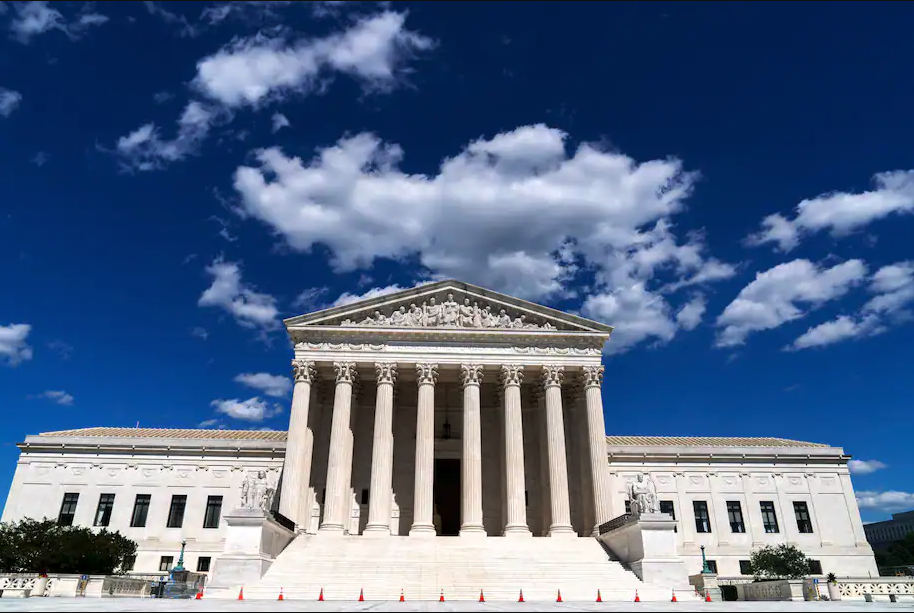Welcome to This Week in Civil Rights and Civil Liberties. This week, three white men were found guilty in the murder of Ahmaud Arbery, the Supreme Court will hear arguments on pre-viability prohibitions to elective abortion, a Texas Appeals Court affirms the ban on Texas Governor’s ban on mask mandates, and more.
Three white men found guilty of murder in the killing of Ahmaud Arbery. In February 2020, Arbery, a 25-year-old Black man, was pursued and killed by three white men in Georgia who claimed they were carrying out a citizen’s arrest. The defense argued Arbery was shot in self-defense because Arbery resisted the citizen’s arrest. The jury sided with the prosecution which argued self-defense could not apply because the defendants initiated the conflict by chasing Arbery who was “a Black man running down the street.” Georgia Superior Court Judge Timothy Walmsley has yet to set a date for sentencing.
This verdict comes less than a week after Kyle Rittenhouse was acquitted on all charges in the shooting deaths of two men and injuring a third during a Black Lives Matter protest in Kenosha, Wisconsin last year. Rittenhouse claimed his actions were in self-defense. (Bloomberg Law, The New York Times, CNN)
The Supreme Court will hear arguments on whether all pre-viability prohibitions on elective abortions are unconstitutional. Oral arguments are set for Wednesday, December 1st in Dobbs v. Jackson Women’s Health Organization, a case challenging the constitutionality of Mississippi’s Gestational Age Act which bars abortions after the 15th week of pregnancy except in limited circumstances of medical emergencies or severe fetal abnormalities. Mississippi argues the Court must reevaluate the landmark decisions in Roe v. Wade and Planned Parenthood v. Casey which held abortions before the fetus can survive outside the womb, typically around 24 weeks of pregnancy, are constitutionally protected. Public interest in the Court decision in Dobbs dramatically increased after the Supreme Court denied a request to block the enforcement of S.B. 8, a Texas law that functionally bans all abortion six weeks after a pregnant person’s missed period. With the changing composition of the Supreme Court, it remains to be seen where the court will come out on this issue. (SCOTUSBlog)
Texas Appeals Court affirms ban on Texas Governor’s ban on mask mandates. On Monday, November 22, the Fifth Court of Appeals in Dallas affirmed a district court decision that Texas Gov. Greg Abbott’s executive order banning mask mandates wrongfully impeded County Judge Clay Jenkins from protecting his constituents from Covid. Gov. Abbott’s executive order, GA-38, purported to ensure uniformity throughout Texas to protect the health and safety of Texans. As part of that executive order issued on July 29, 2021, the authority of local officials to issue contradictory orders to GA-38 was suspended, and GA-38 specifically mandated no person could be required to wear face coverings. Judge Jenkins subsequently issued an order on August 11, 2021, requiring indoor masking for all employees and visitors. The Appeals Court found Gov. Abbott “has no authority to act unilaterally to ban local mandates for base coverings.” This is but one of a series of legal challenges Gov. Abbott faced since issuing his executive order. (The New York Times)
The Justice Department will pay $130 million to victims of the Parkland Shooting. On February 14, 2018, 17 people were killed and 17 others were injured in a school shooting at Marjory Stoneman Douglas High School. Two days later, the FBI acknowledged it had received two tips in the months before the shooting that, if investigated, could have prevented the massacre. In November 2018, the parents of one of the students who lost her life sued the FBI, arguing the shooting had been completely preventable. Thirty-nine other families later joined the lawsuit. Although scheduled to go to trial in January 2022, the Justice Department asked the court last Monday to stay upcoming hearings and deadlines pending the completion of a settlement agreement. (The New York Times, NPR, CNN)
Philadelphia will face claims a Black former police officer was harassed for supporting BLM. Former Philadelphia police officer Bryan Turner brought claims including racial discrimination, hostile work environment, retaliation, and deprivation of First Amendment rights against Philadelphia. Turner alleges he faced harassment from the police department including discipline for social media posts supporting BLM and disapproving of the police department’s initial failure to take action against another officer who shot an unarmed Black man in the back. He also alleges other officers made hostile comments towards him, and Turner was later fired and charged with obstruction of justice after accusations that he falsified a preliminary arraignment report. Turner was found not guilty by a jury on all charges, but Philadelphia refused to reinstate him. The US District Court for the Eastern District of Pennsylvania denied Philadelphia’s motion to dismiss Turner’s claims. The court determined Turner’s allegations adequately alleged he faced intentional racial discrimination, retaliation, and violations of his First Amendment rights. (Bloomberg Law)

